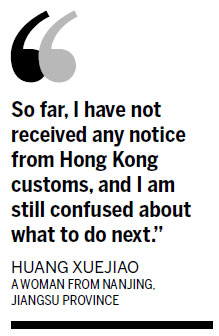Customs officers 'to learn from HK milk incident'
Updated: 2013-03-20 07:15
By Li Yao (China Daily)
|
||||||||

Hong Kong's chief executive said on Tuesday that customs officers will learn from an incident in which they pressed unnecessary charges against a woman from the Chinese mainland who tried to take four cans of milk-flavored rice powder and two tins of infant milk powder over the border.
Customs authorities in Hong Kong admitted on Monday that they pressed unnecessary charges against the woman because they had misunderstood a newly enforced limit on the amount of baby formula allowed to be taken into the mainland.
Chief Executive Leung Chun-ying said officers will learn from the incident and avoid mistakes in the future. He made the comments to media in Tianjin as he met with officials there.
The wrongly-accused woman, 29-year-old Huang Xuejiao from Nanjing, Jiangsu province, was shocked to learn the chief executive had responded to her case.
"I only wanted to share my experience so that other people could avoid the hassle," Huang said.
Huang was stopped by Hong Kong customs officers on Friday with two tins of infant milk powder and four tins of milk-flavored rice powder.
Officers confiscated the six tins, thinking they were all infant-powder products regulated by a new limit. This allows people aged 16 and older to leave Hong Kong with a maximum of 1.8 kg, or roughly two tins, of such products within 24 hours. The new regulation took effect on March 1.
Huang said she knew about the new regulation, but felt it was safe to carry the six tins. This was because she had asked a customs officer when entering Hong Kong and was told that carrying milk-flavored rice powder across the border did not violate the limit on baby formula.
However, she could not present a recording of the conversation as proof. She was allowed to leave after posting bail of HK$1,000 ($130). She was told to report on April 16 to the police station in Lok Ma Chau, which borders the mainland city of Shenzhen, and to appear in court on April 18. Huang felt she had been wronged and shared her experience on her micro blog on Saturday, triggering widespread media attention.
On Monday evening, several media organizations on the mainland received a statement from Hong Kong customs, stating that officers made their initial response because the infant powder and milk-flavored rice powder had similar packages and were both for consumption by infants aged six months and above.
But they later realized that milk-flavored rice powder is not governed by the regulation on infant formula, the statement said.
Huang said: "So far, I have not received any notice from Hong Kong customs, and I am still confused about what to do next. I hope they will drop the case and I no longer need to appear in court."
A lawyer in Hong Kong, who refused to give his name as he could not comment on matters before the court, said it is possible the case will be withdrawn, but it takes time to go through the necessary paperwork.
If the paperwork can't be completed before the scheduled date for a court hearing, Huang can hire a lawyer and win the case, the lawyer said.
Wang Weimin, chairman of the dairy industry association in Xi'an, Shaanxi province, said: "The incident is a big misunderstanding. The customs officers have insufficient knowledge about the regulated goods."
Wang said Hong Kong's limit on baby formula so far has led to foreign brands apparently winning wider market share on the mainland. Many domestic dairy companies have stepped up their quality control and testing capability on harmful substances. But deep-rooted public doubts make these businesses reluctant to compete with foreign brands.
In the first two days of the new limit being introduced, 26 Hong Kong residents, 18 mainland residents and one foreign passport holder were detained, and more than 178 tins of milk powder seized, according to the Hong Kong Security Bureau.
On March 8, two Hong Kong women pleaded guilty and were each fined HK$500 for attempting to carry 1.8 kg of infant powder into Shenzhen, Guangdong province, on March 6.
The new regulation has stirred unease among dairy product dealers in Hong Kong and mainland consumers who prefer buying milk powder in the city because of its high-quality guarantee.
liyao@chinadaily.com.cn
(China Daily 03/20/2013 page5)

 In Photos: 7.0-magnitude quake hits Sichuan
In Photos: 7.0-magnitude quake hits Sichuan
 Li Na on Time cover, makes influential 100 list
Li Na on Time cover, makes influential 100 list
 FBI releases photos of 2 Boston bombings suspects
FBI releases photos of 2 Boston bombings suspects
 World's wackiest hairstyles
World's wackiest hairstyles
 Sandstorms strike Northwest China
Sandstorms strike Northwest China
 Never-seen photos of Madonna on display
Never-seen photos of Madonna on display
 H7N9 outbreak linked to waterfowl migration
H7N9 outbreak linked to waterfowl migration
 Dozens feared dead in Texas plant blast
Dozens feared dead in Texas plant blast
Most Viewed
Editor's Picks

|

|

|

|

|

|
Today's Top News
Live report: 7.0-magnitude quake hits Sichuan, heavy casualties feared
Boston suspect cornered on boat
Cross-talk artist helps to spread the word
'Green' awareness levels drop in Beijing
Palace Museum spruces up
First couple on Time's list of most influential
H7N9 flu transmission studied
Trading channels 'need to broaden'
US Weekly

|

|







